新标准大学英语_视听说教程3原文及翻译
- 格式:doc
- 大小:325.00 KB
- 文档页数:57
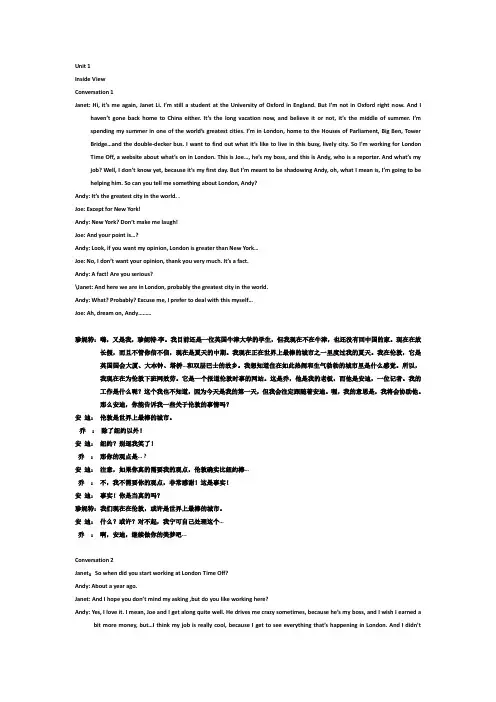
Unit 1Inside ViewConversation 1Janet: Hi, it’s me again, Janet Li. I’m still a student at the University of Oxford in England. But I’m not in Oxford right n ow. And I haven’t gone back home to China either. It’s the long vacation now, and believe it or not, it’s the middle of summer. I’m spending my summer in one of the world’s greatest cities. I’m in London, home to the Houses of Parliament, Big Ben, Tower Bridge…and the double-decker bus. I want to find out what it’s like to live in this busy, lively city. So I’m working for London Time Off, a website about what’s on in London. This is Joe…, he’s my boss, and this is Andy, who is a reporter. And what’s my job? Well, I don’t know yet, because it’s my first day. But I’m meant to be shadowing Andy, oh, what I mean is, I’m going to be helping him. So can you tell me something about London, Andy?Andy: It’s the greatest city in the world. .Joe: Except for New York!Andy: New York? Don’t make me laugh!Joe: And your point is…?Andy: Look, if you want my o pinion, London is greater than New York…Joe: No, I don’t want your opinion, thank you very much. It’s a fact.Andy: A fact! Are you serious?\Janet: And here we are in London, probably the greatest city in the world.Andy: What? Probably? Excuse me, I pre fer to deal with this myself…Joe: Ah, dream on, Andy………珍妮特:嗨,又是我,珍妮特.李。
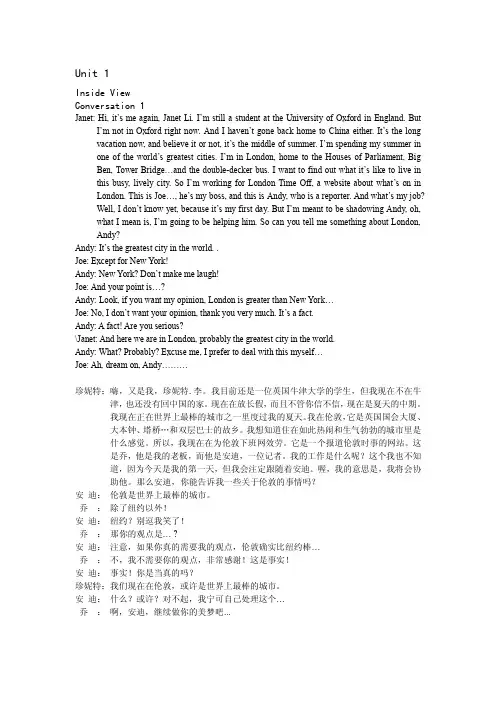
Unit 1Inside ViewConversation 1Janet: Hi, it‘s me again, Janet Li. I‘m still a student at the University of Oxford in England. But I‘m not in Oxford right now. And I haven‘t gone back home to China either. It‘s the long vacation now, and believe it or not, it‘s the middle of summer. I‘m spending my summer in one of the world‘s greatest cities. I‘m in London, home to the Houses of Parliament, Big Ben, Tower Bridge…and the double-decker bus. I want to find out what it‘s like to live in this busy, lively city. So I‘m working for London Time Off, a website about what‘s on in London. This is Joe…, he‘s my boss, and this is Andy, who is a reporter. And what‘s my job?Well, I don‘t know yet, because it‘s my first day. But I‘m meant to be shadowing Andy, oh, what I mean is, I‘m going to be helping him. So can you tell me something about London, Andy?Andy: It‘s the greatest city in the world. .Joe: Except for New York!Andy: New York? Don‘t make me laugh!Joe: And your point is…?Andy: Look, if you want my opinion, London is greater than New York…Joe: No, I don‘t want your opinion, thank you very much. It‘s a fact.Andy: A fact! Are you serious?\Janet: And here we are in London, probably the greatest city in the world.Andy: What? Probably? Excuse me, I prefer to deal with this myself…Joe: Ah, dream on, Andy………珍妮特:嗨,又是我,珍妮特.李。
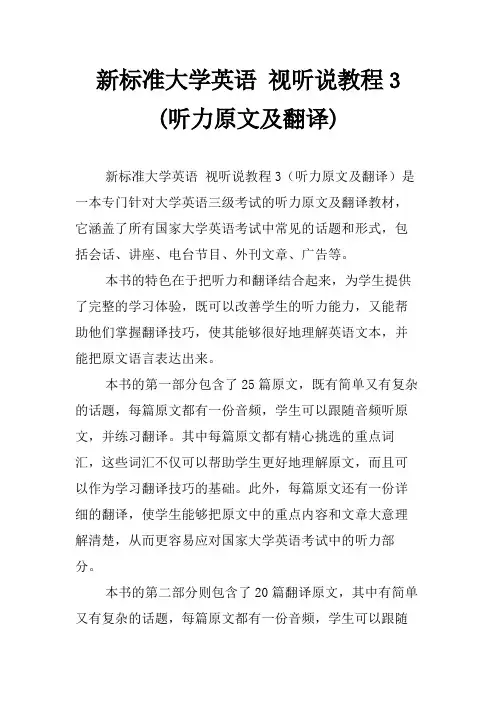
新标准大学英语视听说教程3(听力原文及翻译)新标准大学英语视听说教程3(听力原文及翻译)是一本专门针对大学英语三级考试的听力原文及翻译教材,它涵盖了所有国家大学英语考试中常见的话题和形式,包括会话、讲座、电台节目、外刊文章、广告等。
本书的特色在于把听力和翻译结合起来,为学生提供了完整的学习体验,既可以改善学生的听力能力,又能帮助他们掌握翻译技巧,使其能够很好地理解英语文本,并能把原文语言表达出来。
本书的第一部分包含了25篇原文,既有简单又有复杂的话题,每篇原文都有一份音频,学生可以跟随音频听原文,并练习翻译。
其中每篇原文都有精心挑选的重点词汇,这些词汇不仅可以帮助学生更好地理解原文,而且可以作为学习翻译技巧的基础。
此外,每篇原文还有一份详细的翻译,使学生能够把原文中的重点内容和文章大意理解清楚,从而更容易应对国家大学英语考试中的听力部分。
本书的第二部分则包含了20篇翻译原文,其中有简单又有复杂的话题,每篇原文都有一份音频,学生可以跟随音频听原文,并练习翻译。
其中每篇原文都有精心挑选的重点词汇,这些词汇不仅可以帮助学生更好地理解原文,而且可以作为学习翻译技巧的基础。
此外,每篇原文还有一份详细的翻译,使学生能够把原文中的重点内容和文章大意理解清楚,从而更容易应对国家大学英语考试中的翻译部分。
最后,本书还包含了一份完整的练习册,其中包含了45篇听力原文,其中有简单又有复杂的话题,每篇原文都有一份音频,学生可以跟随音频听原文,并练习翻译。
其中每篇原文都有精心挑选的重点词汇,这些词汇不仅可以帮助学生更好地理解原文,而且可以作为学习翻译技巧的基础。
此外,每篇原文还有一份详细的翻译,使学生能够把原文中的重点内容和文章大意理解清楚,从而更容易应对国家大学英语考试中的听力部分。
总之,新标准大学英语视听说教程3(听力原文及翻译)是一本非常有用的教材,它既可以改善学生的听力能力,又能帮助他们掌握翻译技巧,使其能够很好地理解英语文本,并能把原文语言表达出来。
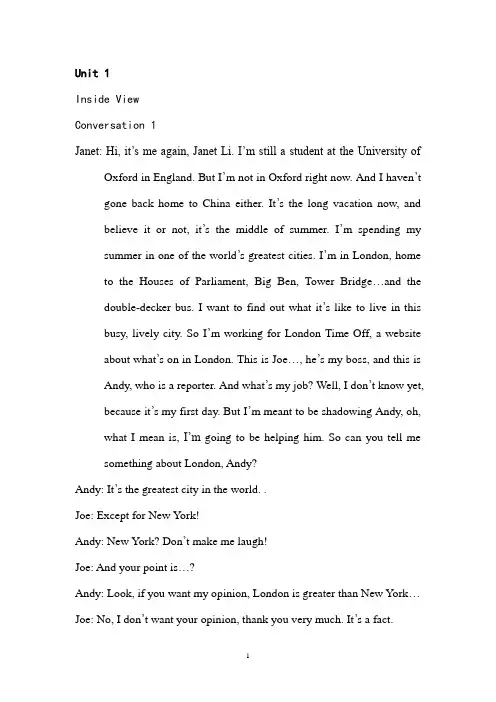
Unit 1Inside ViewConversation 1Janet: Hi, it’s me again, Janet Li. I’m still a student at the University of Oxford in England. But I’m not in Oxford right now. And I haven’t gone back home to China either. It’s the long vacation now, and believe it or not, it’s the middle of summer. I’m spending my summer in one of the world’s greatest cities. I’m in London, home to the Houses of Parliament, Big Ben, Tower Bridge…and the double-decker bus. I want to find out what it’s like to live in this busy, lively city. So I’m working for London Time Off, a website about what’s on in London. This is Joe…, he’s my boss, and this is Andy, who is a reporter. And what’s my job? Well, I don’t know yet, because it’s my first day. But I’m meant to be shadowing Andy, oh, what I mean is, I’m going to be helping him. So can you tell me something about London, Andy?Andy: It’s the greatest city in the world. .Joe: Except for New York!Andy: New York? Don’t make me laugh!Joe: And your point is…?Andy: Look, if you want my opinion, London is greater than New York…Joe: No, I don’t want your opinion, thank you very much. It’s a fact.Andy: A fact! Are you serious?\Janet: And here we are in London, probably the greatest city in the world.Andy: What? Probably? Excuse me, I prefer to deal with this myself…Joe: Ah, dream on, Andy………珍妮特:嗨,又是我,珍妮特.李。
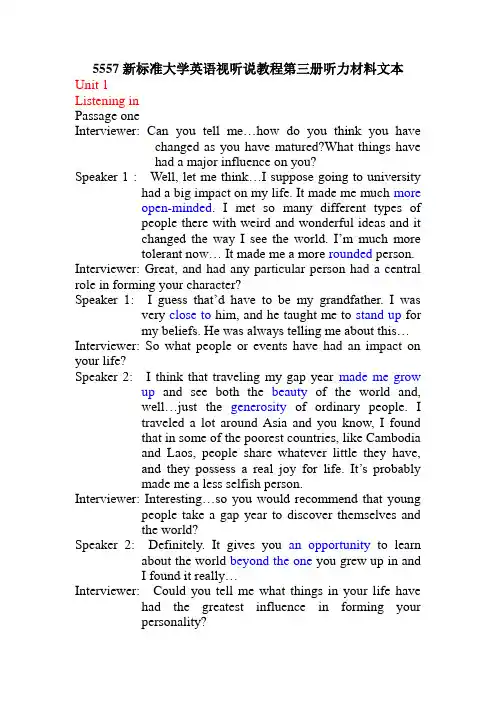
5557新标准大学英语视听说教程第三册听力材料文本Unit 1Listening inPassage oneInterviewer: Can you tell me…how do you think you have changed as you have matured?What things havehad a major influence on you?Speaker 1 : Well, let me think…I suppose going to university had a big impact on my life. It made me much moreopen-minded. I met so many different types ofpeople there with weird and wonderful ideas and itchanged the way I see the world. I’m much moretolerant now… It made me a more rounded person. Interviewer: Great, and had any particular person had a central role in forming your character?Speaker 1: I guess that’d have to be my grandfather. I was very close to him, and he taught me to stand up formy beliefs. He was always telling me about this…Interviewer: So what people or events have had an impact on your life?Speaker 2: I think that traveling my gap year made me grow up and see both the beauty of the world and,well…just the generosity of ordinary people. Itraveled a lot around Asia and you know, I foundthat in some of the poorest countries, like Cambodiaand Laos, people share whatever little they have,and they possess a real joy for life. It’s probablymade me a less selfish person.Interviewer: Interesting…so you would recommend that young people take a gap year to discover themselves andthe world?Speaker 2: Definitely. It gives you an opportunity to learn about the world beyond the one you grew up in andI found it really…Interviewer: Could you tell me what things in your life have had the greatest influence in forming yourpersonality?○Sp eaker 3: Well…a couple of years ago I was on a reality TV show where a group of young people all lived in ahouse together. Each week some one was voted offby the audience. I got down to the final three! Isuppose being on the show and seeing how theother contestants behaved made me realize howselfish and spiteful some people can be just to getwhat they want. I also realized it’s best to just beyourself in life. If you pretend to be someonedifferent people will eventually see through the lies. Interviewer: Right…And how did you feel when you were eventually voted off?Speaker 3: Relieved, to be honest with you. But you know, a slight regret that I didn’t win because I kind of…Interviewer: So you can tell me, what one thing do you think that has had the biggest impact on your life? Speaker 4: Hmm, that’s a difficult question. But I think helping victims of the tsunami in 2004 had a verygreat impact on me. I’m half Thai and I’d justarrived in Thailand for a family Christmas holiday.When I heard the news I knew I had to help-youcouldn’t not. I ended up acting as an interpreter fora group of volunteer doctors. It was an incrediblydifficult time but you know, even in the middle ofsuch a horrific tragedy there is still a huge amountof genuine human kindness.Interviewer: That’s amazing! And has it changed the way you view your future…Passage twoTony: Talking to us today in our Life Choices series is Joan Robinson, an academic counselor at ManchesterUniversity. She gives advice to school students onchoosing the right subject to study at university. Joan,welcome to the show.Joan: Thanks Tony.Tony: So Joan, what do our listeners need to think about when choosing a course? It’s a huge, potentially life-changingdecision, isn’t it?Joan: Yes. I generally give students advice in two areas. Firstly, know yourself, and secondly, think to the future.Tony: When you say “know yourself〞what do you mean? Joan: Basically, I mean evaluate your own personal strengths and weaknesses, your personality traits〔特质〕and the things you like.Tony: I see…So how can our listeners do this?Joan: Well, start by asking yourself questions to help reflect on your life so far. For example, what subjects are you good at? Are you an organized and self-disciplined person? Are you confident and outgoing? Do you like working with others in a team or do you prefer working alone? These kinds of questions will help you discover more about yourself.Tony: Sounds like good advice. How about your second point regarding the future?Joan: Well, your choice of major subject is likely to have a significant impact on your future career so it’s importantto look into this carefully. I recommend you check notonly which academic subjects will help you get into aparticular area of work, but also look carefully at whatuniversities offer. Each university has its strengths so tryto choose one that is the best in your chosen field. Findout what links the department has to related industries andleading companies in it.Tony: Good point. Now I’d like to take some calls from our listeners. First up we have James on the line. Hi, James!How can we help?James: Hi. I’m interested in career in IT and I’d like to ask Joan whether she thin ks it’s better to go to a highly respecteduniversity, like Oxford, or to study somewhere that hasmore of a vocational focus?Joan: Well, James, you know it really depends on what you expect to get out of a university and how you see yourfuture. Basically a handful of the brightest graduates arepicked from the top universities around the world to jointhe leading IT companies. So I’d say if you’re a high-flyerthen this is the route that might be for you. But if you arelooking for a more mainstream 〔主流〕career then you should consider a course that helps you acquire practical,transferable skills that you can use in the workplace…andlook at which universities have the best levels of graduaterecruitment for the kind of job you are aiming for. James: I s ee! Thanks a lot. That really helps me out…UNIT3Listening in conversation 1Lily: So what was the highlight of your trip to (South)Korea? Hugh: Well that's…let me see...it's got to be going to see Nanta. Lily:What on earth is Nanta?Hugh:It's this amazing live show-part theater-part dance-part music.Lily: Sounds really interesting. But why’s it so brilliant? Hugh: I think it's the energy of the performers. Also it has a unique concept. It's a mixture of traditional Koreanmusic, percussion and drums, into a western styleperformanceLily: I've never heard of it. Has it ever been performed in the West?Hugh: Yeah, it's been a sell-out. They've toured in over 30 countries since the show began in 1997.It's a non-verbalperformance so there are no language barriers. That'swhat's made it an international success.Lily: What else makes it so special then?Hugh: Well...the other thing is that all the action takes place in the kitchen. You see these four chefs preparing the foodfor a wedding reception. The performers use knives,dustbin lids and various other kitchen utensils to create ahypnotic soundtrack. The food literally flies everywhere!It's hilarious.Lily: That sounds quite funny I must admit. Is there an actual story though?Hugh: Oh yes, there is a story. The four chefs have to prepare the meal by 6 o'clock and they also have to give themanager's nephew cooking lessons too, which adds tothe fun. There’s loads of audience participation anddespite there being no language involved you getcompletely engrossed. It's really quite wacky!Lily: And what about the audience? I suppose they start throwing food around…?Hugh: Not quite! But they are totally involved in what's going on-everyone loves it. It's a really great family show. Infact it's one of the best shows I've ever seen. Jim, myfriend, says he takes all his visitors. He's seen it abouteight times and still loves it.Lily: I bet it's popular with tourists then.Hugh: Well apparently over a million foreign tourists in (South)Korea have seen the show and it's had a run onBroadway too. It first got popular after they appeared atthe Edinburgh Festival. Now they are planning to tourmore cities in Asia where (South) Korean popular cultureis becoming incredibly trendy.Lily:By the way what does“Nanta〞mean?Hugh:It means random drumming in Korean. The English name for the show is Cookin’, which gives you a clearer ideaof what it's all about.Lily:You've got me interested now. I'll have to check it out on the internet.Listening inConversation 2Interviewer: Kathy Richards is a specialist art tour guide.Kathy-can you tell us what trends you've noticed inrecent years?Kathy: Well, one of the biggest phenomena I've noticed is a huge increase in visitors to galleries-and a growinginterest in modern art in general.Interviewer: What do you think the reason is for that?Kathy: Well, there are several reasons, I think. The most important ones are firstly, that some newcontemporary art galleries have opened which havehad a lot of publicity, and secondly the youngergeneration feel more comfortable with modern artso the kind of people visiting galleries is changing.Finally, the new generation of galleries havebecome destinations in themselves...they tend to behoused in amazing buildings.Interviewer: So which are the most popular new galleries? Kathy: Well, the Tate Modern in London has had over 30 million visitors since it opened in 2000.The annualaverage is now over 4.5 million. The Museum ofModern Art, or MoMA in New York is an oldergallery, it was founded in 1929 but has beenrecently reno vated and expanded. This work wasfinished in 2006 and it had over 2.5 million visitorsin the first year after reopening. Another verysuccessful new gallery is the Guggenheim in Bilbaoin Spain. It opened in 1997 and now gets about amillion visitors a year.Interviewer: Those are pretty impressive figures. Maybe the fact that the Tate Modern is free to visit might havesomething to do with it?Kathy: It's true that entrance to the permanent collection is free but the numbers of people visiting thetemporary exhibition are also high-and the entrancefee is usually about ten pounds.Interviewer: Do you have to pay to get into the other galleries you mentioned?Kathy: Oh yes. You do. Admission to MoMA is 20 US dollars and the Guggenheim in Bilbao costs eighteuros.Interviewer: Do people mind paying, do you think?Kathy: No, I don't think they do mind. Most people feel the fees are reasonabl e considering the outstandingcollections of priceless works of art that they get tosee.Interviewer: You mentioned that the buildings that art galleries are in can be an attraction themselves these days... Kathy: Well, yes, the Guggenheim has literally revitalized the whole city and put Bilbao on the tourist map.It's got a futuristic, curvy metallic structure andpeople love it. The Tate Modern has helpedredevelop an old industrial area beside the RiverThames. The gallery itself is actually inside a huge ,old, brick power station. And MoMA is interestingas it's in downtown New York.Interviewer: And who visits these galleries? What's the profile of the average art lover?Kathy: Well, in the past museums and galleries were seen as appealing to the older generation. But in fact, 48percent of visitors to the Tate Modern are under35...UNIT5Listening in 1Today we’ll focus on two aspects of group behaviour.Firstly,how groups develop,and secondly,the roles individuals play within a group.It’s widely acknowledged that the performance of effective groups is often greater than the sum of the individuals in the group.This is due to what we call synergy-in other words,the extra energy and effevtiveness that people create when they work together.Early research in this field carried out in the 1930s by Elton Mayo discovered something that he called the “Hawthorne effect〞.The idea is that when individual know they are part of a study,their productivity automatically increases regardless of other factors,such as how much time or money they are given,for example.The research suggests that things like personal identity,s elf-esteem and the social context in which a group is working are really very important factors in improving the performance of individuals.If we move on to look at the nature of groups more closely,we find that groups have natural phasese that can help us understand their effectiveness.You have probably all had experience of working with other people in a group that,at firsl,wasn,t very productive.This phenomenon was studied by Tuckman in the 1960s,and he created a model to describe the stages of a group.The first stage is known as〞Forming〞which is when individual members get to know each other.This is followed by〞Storming〞when individual start to share their ideas and creative energy.The third phase is〞Norming〞where a group identity begins to form.The final stage is〞Performing〞when individuals within the group work together.And it is at this stage that the group achieves results.Understanding these phases can help us ensure that members of a group work together to overcome early loner.The〞Resource investigator〞is the group member who is always curious and explores new ideas and the〞Monitorevaluator〞is calm and serous and makes good,balanced decisions.The〞Team worker〞in contrast is a socially orientated and sensitive member of the team who is able to encourage a team spirit.And the〞Comleter-finisher〞is a conscientious perfectionist who follows through on the details and ties up and loose ends.To be effective,a team needs to have a variety of members who can fulfill all these different roles.Listening in 2Today I'm reporting from Phuket in Southern Thailand.Parts of the island were devastated by the tsunami in 2004,and over 250 people lost their lives here. I've come back to see how one community has recovered.Here in the village of The Chat Chai,the rebuilding of the destroyed homes has been led by the international organazition Habitat for Humanity.About a year after the tsunami occurred,volunteers began building 36 new homes for local families.One villager,Somwang,is certainly very happy with the results.He used to live in a small hut on his two square metre plot of land near the sea.The local community wanted him to have a bigger home and despite the small size of his plot of land,t hey built him a three-storey house,which is now the tallest in the village. A happy ending to such a horrific tragedy.The rebuilding here has also had a positive effect on the local economy,because the earth bricks that were used to build the homes were produced in Khao Lak,another tsunami hit island——all part of a post-tsunami livelihood development project.Talking to people here,I've discovered that the project not only provided them with much needed shelter,but also the process has helped rebuild a spirit of community amongst them.A host of foreign as well as local volunteers joined together to work in rebuilding the villagers' homes and lives,and even an American TV celebrity volunteered.The project has also been visited by former US president Jimmy Carter,who is an active supporter of Habitat for Humanity.He and his wife offer one week of their time every year to volunteer on construction projects around the world.It's certainly encouraging to see the strength of the human spirit and generosity of people who help others in times of need. Habitat for Humanity is continuing their work in the south of Thailand,helping poor local families and communities to improve their lives.Their "Save&Bulid" scheme encourages families to save 30 per cent of the cost of building or rebuilding their home.The charity then lends the family the rest of the money they need,and helps in the building of their new home.It's then paid for in monthly repayments of under $30,which supports those who want to build a better life for themselves.This is Marianne Harper reporting from Southern Thailand...Uint 9Listening inPart 1OK,so a little test .Coca-Cola...Nike...ferrari.Think!What image did you get as I said these very famous brandnames?Wait a moment.There’s no real need to answer,is there,because we know,more or less,don’t we?Coca-Cola—that delicious fizzy drink,ice cold,on a summer’s day. Nike, running shoes for strong,beautiful bodies.Ferrari—an attractive,powerful car for attractive,powerful people.The fact, the names, the brand names say it all.what’s in a brandname?Ideally,everything!Everything the manufacturer wants you to think of when you hear the name.that’s certainly what both customers’exeprience and research tells us.it’s the reasons why manufacturers attach such importance to choosing the right name for their products.Let’s have a look at some of the qualities a good brand name should have.Firstly ,it should be simple and easy to remember.Imagine if Coca-Cola had been namd “Cocafantaslicola〞.It’s just too long!Or,take other name—starbucks,the name of a famous coffee shop.now,that’s an easy name to remember,starbucks.Second point,the brand name should bedifferent,unique,something you can’t confuse with anything else.Like Coca-Cola.Or—let’s take a nother famous brand name—Microsoft.It combines two words,micro,meaning very small,and the word soft.Two words that together make a unique name—Microsoft.Thirdly,if the word is a real word,it should be strong,positive associations.Take the name Alfa Romeo,Alfa is the first letter of the Greek alphabet and has the association of the best or the stronges t.Romeo is the name of the most romantic lovers of all in a famous Shakespeare play.AlfaRomeo—strong,romantic.The words have great association,don’t they?Forth point,the sound of the name is very important.take Ferrari.The word has a long vowel sound—“aaari〞—that makes it sound luxurious.So Ferrari must be a luxuriouscar.How about Coca-Cola?It’s got a sharp,fizzy sound,just like the drink.So—all these things are what you should be looking for when choosing a brand name—somethingsimple,memorable,unique,with positive association and a great sound.whew!It’s not easy,is it,to choose a name that does all those things?But the very best brand names do exactly that. Part 2Interviewer: Clare, tell me about the names in your family. You say some of them have quite an interesting history.Clare: Yes, they do. Well, ok, I’ll begin with my own name. My maiden name was Habibis, but I’m married and my name’s Clare Thompson.Interviewer: Thompson.Clare: Yes. I don’t know much about the names or my husband’s side of the family, so I’ll talk about my own instead…OK, so…my full name’s Clare Elsie Thompson. “Elsie〞is my middle name , which used to be a very old-fashioned name. in fact, it’s just come back into fashion-I met someone who called their baby 〞Elsie〞-but when I was younger it was the kind of name that made people laugh and I hated it.. Anyway, my parents wanted to name me after my grandmother, whose name was Elsie Clare, so their first idea was to call me Elsie Clare. Interviewer: Elsie Clare!Clare: Yes, but when they told my grandmother, she was horrified, and said, “you can’t do that to the child, I’ve had to put up with Elsie all my life, I don’t want her to have to〞. So they called me Clare Elsie instead.Interviewer: Sounds better!Clare: Yes…My father’s surname is Habibis . My mum’s English but he was Greek, so that was the name I grew up with. But Habibis isn’t a Greek name. It’s a Middle Eastern n ame and means “loved one〞in Arabic.Interviewer: Really?Clare: Yes, and the reason for the surname, we discovered, is that my great-grandfather on my father’s side lived in Lebanon—there was a well-established Greek community there.And my great-grandfather was a very sociable, friendly kind of person and everyone liked him a lot so they gave him the name, “Habibi〞,which means “loved one〞Interviewer: Ah, that’s lovely!Clare: Yes, I do like that story. But my father had a great first name too. He was called Homer, after the Ancient Greek poet. Interviewer: The English would see that as a very unusual name, but I suppose the Greeks wouldn’t, would they? Clare: No, I don’t think so. But one of his brothers was called Mitton.Interviewer: Mitton , the 17th century English poe t? Clare: Yes. And you wouldn’t think that a Greek family would call their son after an English poet, would you? But they did! Unit 10Inside viewConversation 1Andy: So today, we're meant to be meeting a woman who does walking tours aroundmysterious London.Janet: What's that about?Joe: Aha! That's what we're going to find out. Apparently, she takes visitors round the mysterious sights of London. Anyway, ask her yourself!Janet: Why me?Andy: We were going to ask you, Janet, if you like to do the interview?Janet: Me? But I don't know anything about London!Andy: Which makes you a perfect person to ask some real questions.Janet: I don't believe it.Joe: And if you're any good, we'll upload your interview next week.Janet: I'm not sure what to say .It's great but are you absolutely sure you think I'm OK for this?Joe: Too late, here she comes. Hi, this is Janet……Janet: Emma, tell us about some of the legendary characters in London.Emma: Well, legendary characters might be complete myths or they may have actually existed. For example, most people believe that the famous detective Sherlock Holmes must have existed. But in fact, we know he can't have existed.Janet: And what about Guy Fawkes?Emma: Yes, Guy Fawkes did actually exist and he tried to blow up the Houses of Parliament. But we celebrate him every year on Guy Fawkes Night every 5th of November, and in fact, he's considered to be one of the most popular people in British history!Janet: And I've heard something about Dick Whittington and his cat?。
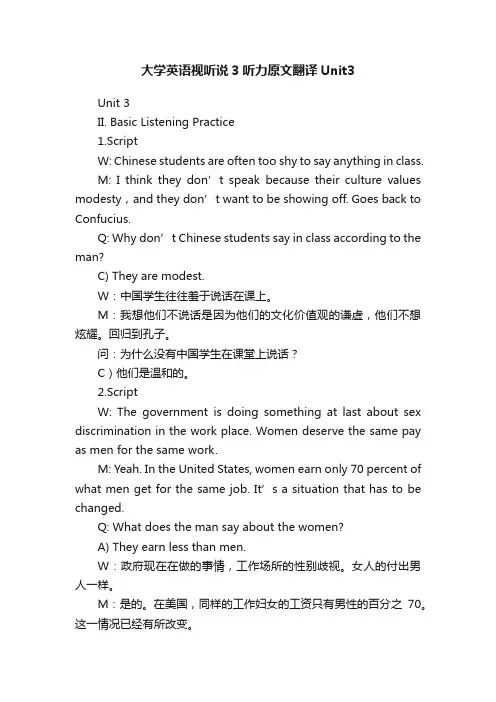
大学英语视听说3听力原文翻译Unit3Unit 3II. Basic Listening Practice1.ScriptW: Chinese students are often too shy to say anything in class.M: I think they don’t speak because their culture values modesty,and they don’t want to be showing off. Goes back to Confucius.Q: Why don’t Chinese students say in class according to the man?C) They are modest.W:中国学生往往羞于说话在课上。
M:我想他们不说话是因为他们的文化价值观的谦虚,他们不想炫耀。
回归到孔子。
问:为什么没有中国学生在课堂上说话?C)他们是温和的。
2.ScriptW: The government is doing something at last about sex discrimination in the work place. Women deserve the same pay as men for the same work.M: Yeah. In the United States, women earn only 70 percent of what men get for the same job. It’s a situation that has to be changed.Q: What does the man say about the women?A) They earn less than men.W:政府现在在做的事情,工作场所的性别歧视。
女人的付出男人一样。
M:是的。
在美国,同样的工作妇女的工资只有男性的百分之70。
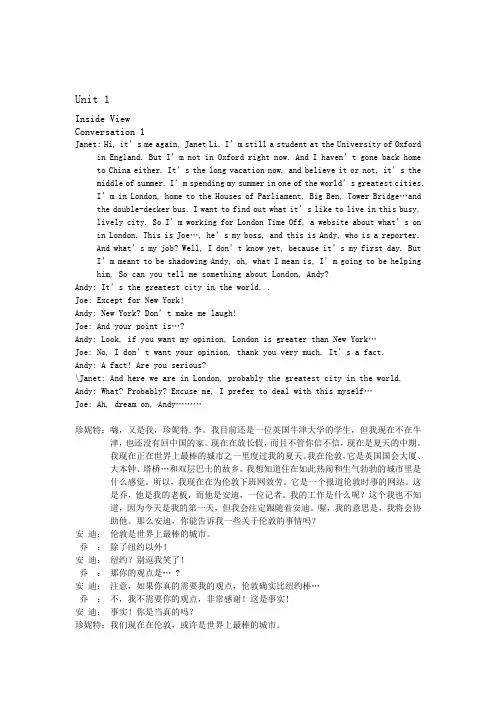
Unit 1Inside ViewConversation 1Janet: Hi, it’s me again, Janet Li. I’m still a student at the University of Oxford in England. But I’m not in Oxford right now. And I haven’t gone back home to China either. It’s the long vacation now, and believe it or not, it’s the middle of summer. I’m spending my summer in one of the world’s greatest cities.I’m in London, home to the Houses of Parliament, Big Ben, Tower Bridge…and the double-decker bus. I want to find out what it’s like to live in this busy, lively city. So I’m working for London Time Off, a website about what’s on in London. This is Joe…, he’s my boss, and this is Andy, who is a reporter.And what’s my job? Well, I don’t know yet, because it’s my first day. But I’m meant to be shadowing Andy, oh, what I mean is, I’m going to be helping him. So can you tell me something about London, Andy?Andy: It’s the greatest city in the world. .Joe: Except for New York!Andy: New York? Don’t make me laugh!Joe: And your point is…?Andy: Look, if you want my opinion, London is greater than New York…Joe: No, I don’t want your opinion, thank you very much. It’s a fact.Andy: A fact! Are you serious?\Janet: And here we are in London, probably the greatest city in the world. Andy: What? Probably? Excuse me, I prefer to deal with this myself…Joe: Ah, dream on, Andy………珍妮特:嗨,又是我,珍妮特.李。
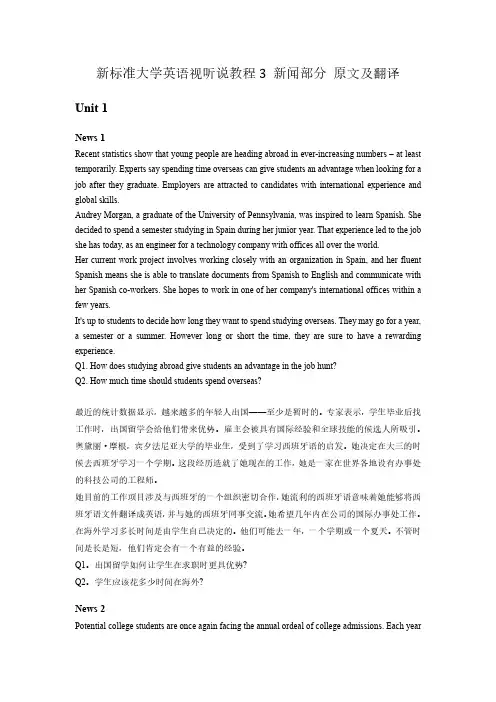
新标准大学英语视听说教程3 新闻部分原文及翻译Unit 1News 1Recent statistics show that young people are heading abroad in ever-increasing numbers – at least temporarily. Experts say spending time overseas can give students an advantage when looking for a job after they graduate. Employers are attracted to candidates with international experience and global skills.Audrey Morgan, a graduate of the University of Pennsylvania, was inspired to learn Spanish. She decided to spend a semester studying in Spain during her junior year. That experience led to the job she has today, as an engineer for a technology company with offices all over the world.Her current work project involves working closely with an organization in Spain, and her fluent Spanish means she is able to translate documents from Spanish to English and communicate with her Spanish co-workers. She hopes to work in one of her company's international offices within a few years.It's up to students to decide how long they want to spend studying overseas. They may go for a year, a semester or a summer. However long or short the time, they are sure to have a rewarding experience.Q1. How does studying abroad give students an advantage in the job hunt?Q2. How much time should students spend overseas?最近的统计数据显示,越来越多的年轻人出国——至少是暂时的。
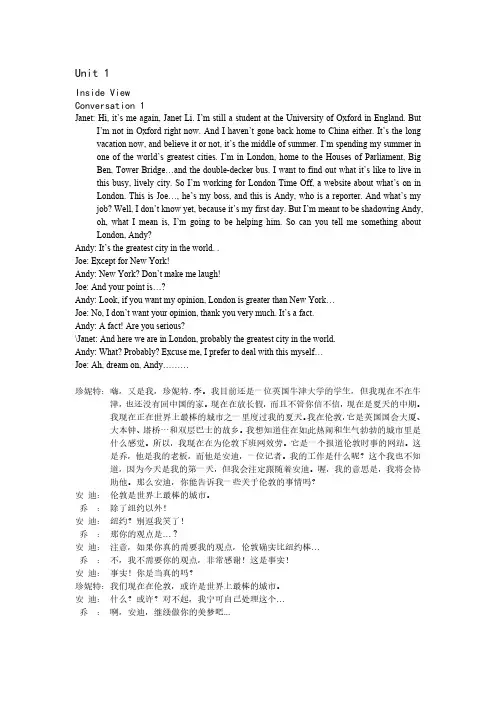
Unit 1Inside ViewConversation 1Janet: Hi, it’s me again, Janet Li. I’m still a student at the University of Oxford in England. But I’m not in Oxford right now. And I haven’t gone back home to China either. It’s the long vacation now, and believe it or not, it’s the middle of summer. I’m spending my summer in one of the world’s greatest cities. I’m in London, home to the Houses of Parliament, Big Ben, Tower Bridge…and the double-decker bus. I want to find out what it’s like to live in this busy, lively city. So I’m working for London Time Off, a website about what’s on in London. This is Joe…, he’s my boss, and this is Andy, who is a reporter. And what’s my job? Well, I don’t know yet, because it’s my first day. But I’m meant to be shadowing Andy, oh, what I mean is, I’m going to be helping him. So can you tell me something about London, Andy?Andy: It’s the greatest city in the world. .Joe: Except for New York!Andy: New York? Don’t make me laugh!Joe: And your point is…?Andy: Look, if you want my opinion, London is greater than New York…Joe: No, I don’t want your opinion, thank you very much. It’s a fact.Andy: A fact! Are you serious?\Janet: And here we are in London, probably the greatest city in the world.Andy: What? Probably? Excuse me, I prefer to deal with this myself…Joe: Ah, dream on, Andy………珍妮特:嗨,又是我,珍妮特.李。

Conversaion1A:I love Chinese,but is the food around here typical?J:Well,it depends what you mean by typical.This is mostly Cantonese food from the south,excepet for the roast duck,which is from Beijing.But it is different from the food where I come from in the northeast. A:And which is better?J:Er,well,in my opinion,I think~Oh,look,here he comes.Hi,Tony.T:Hi,Li Hui,ni hao.J:Ni hao.Tony,this is Andy,my colleage.A/T:Hi.J:We were wondering if we could ask you some questions about life in Chinatown.A:I don’t know if Janet’s told you,but we are doing a series of reviews on ethnic restaurants here in London for London Time Off. T:Ok,I see.A:And the thing is,everyone eats Chinese and Indian food,but we want to put a bit of background and history on the website.Are you up for this? T:Ok,fire away.A:What I suggest is,if you’ve got time,we will do some filming around here,and then we will put the research together back at thestudio.5252/126页A:Janet,are you ready with the sound this time? J:Ok.A:Just remember to keep the needle out of the red zone.And don’t forgetto stop us if there’s too much background noise.J:Ok,thanks.A:Tony,you work here in Chinatown.Do you live here as well? T:No,in fact,very few Chinese actually live in Chinatown. A:And in comparison with Chinatown in say,San Francisco or Sydney,islarger or smaller?T:I would say it’s much smaller.Really.It’s only three or four streets. A:And the business here,is it mostly restaurant trade? T:Yes,as well as the supermarkets,which stock produce from China.A:我喜欢中国菜,但这附近有代表性的食物吗,J:嗯,这取决于你说的典型是什么意思。
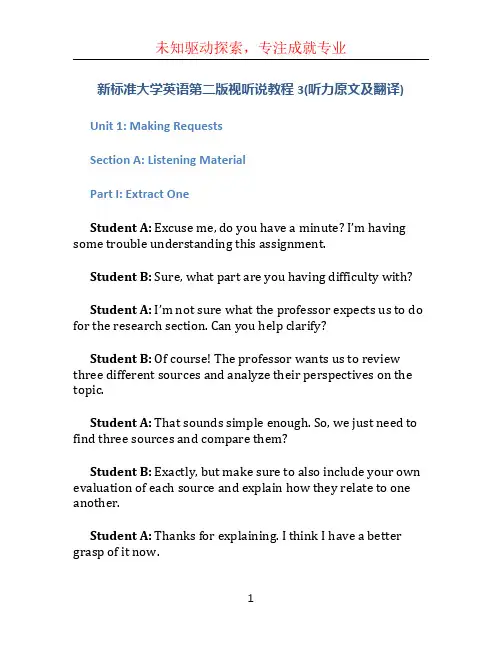
新标准大学英语第二版视听说教程3(听力原文及翻译)Unit 1: Making RequestsSection A: Listening MaterialPart I: Extract OneStudent A:Excuse me, do you have a minute? I’m having some trouble understanding this assignment.Student B: Sure, what part are you having difficulty with?Student A:I’m not sure what the professor expects us to do for the research section. Can you help clarify?Student B: Of course! The professor wants us to review three different sources and analyze their perspectives on the topic.Student A: That sounds simple enough. So, we just need to find three sources and compare them?Student B: Exactly, but make sure to also include your own evaluation of each source and explain how they relate to one another.Student A: Thanks for explaining. I think I have a better grasp of it now.Student B: No problem, always happy to help!Student A: I appreciate it. Thanks again!Part I: Translation学生A:打扰一下,你有时间吗?我对这个作业有些困惑。
Unit 2II. Basic Listening Practice1.ScriptM: Now we have satellite and high-powered microscopes, it's easy to think we know everything about the world; but we still don't understand EI Nino.W: Right. Even the scientists are uncertain about the exact cause of the warm Pacific current that brings storms or drought—the mysterious EI Nino.Q: Which of the following is true according to the conversation?B) Even scientists cannot understand EI Nino.男:现在我们有卫星和高性能的显微镜,我们知道世界上的一切是很容易的;但我们仍不了解尼诺现象。
W:右。
甚至科学家也不知道确切的原因温暖的太平洋洋流带来的风暴或干旱的神秘的尼诺。
问:根据对话,下列哪项是正确的?B)连科学家们无法理解尼诺。
2. ScriptM: Everyone is talking about environmental problem: acid rain, greenhouse effect, holes in the ozone layer. We should think positively. What can we do to improve things?W: I agree. We could do a lot more to harness the sun's energy for heating and lighting in our homes. Millions of solar roofs are now emerging in Japan, the U.S., Italy, and Germany.Q: How do the man and the woman view the environment?D) Both the man and woman think positively about it.M:每个人都在谈论环境问题:酸雨,温室效应,臭氧层的洞。
Unit 1Inside ViewConversation 1Janet: Hi, it’s me again, Janet Li. I’m still a student at the University of Oxford in England. But I’m not in Oxford right now. And I haven’t gone back home to China either. It’s the long vacation now, and believe it or not, it’s the middle of summer. I’m spending my summer in one of the world’s greatest cities. I’m in London, home to the Houses of Parliament, Big Ben, Tower Bridge…and the double-decker bus. I want to find out what it’s like to live in this busy, lively city. So I’m working for London Time Off, a website about what’s on in London. This is Joe…, he’s my boss, and this is Andy, who is a reporter. And what’s my job? Well, I don’t know yet, because it’s my first day. But I’m meant to be shadowing Andy, oh, what I mean is, I’m going to be helping him.So can you tell me something about London, Andy?Andy: It’s the greatest city in the world. .Joe: Except for New York!Andy: New York? Don’t make me laugh!Joe: And your point is…?Andy: Look, if you want my opinion, London is greater than New York…Joe: No, I don’t want your opinion, thank you very much. It’s a fact. Andy: A fact! Are you serious?\Janet: And here we are in London, probably the greatest city in the world. Andy: What? Probably? Excuse me, I prefer to deal with this myself…Joe: Ah, dream on, Andy………珍妮特:嗨,又是我,珍妮特.李。
Conversaion1A:I love Chinese,but is the food around here typical?J:Well,it depends what you mean by typical.This is mostly Cantonese food from the south,excepet for the roast duck,which is from Beijing.But it is different from the food where I come from in the northeast. A:And which is better?J:Er,well,in my opinion,I think~Oh,look,here he comes.Hi,Tony.T:Hi,Li Hui,ni hao.J:Ni hao.Tony,this is Andy,my colleage.A/T:Hi.J:We were wondering if we could ask you some questions about life in Chinatown.A:I don ' t know if Janet ' s told you,but we are doing a series of reviews on ethnic restaurants herein London for London Time Off. T:Ok,I see.A:And the thing is,everyone eats Chinese and Indian food,but we want to put a bit of background and history on the website.Are you up for this? T:Ok,fire away.A:What I suggest is,if you ' ve got time,we will do some filming around here,and then we will put the research together back at thestudio.5252/126 页A:Janet,are you ready with the sound this time? J:Ok.A:Just remember to keep the needle out of the red zone.And don ' t forgetto stop us if there ' s too much background noise.J:Ok,thanks.A:Tony,you work here in Chinatown.Do you live here as well? T:No,in fact,very few Chinese actually live in Chinatown. A:And in comparison with Chinatown in say,San Francisco or Sydney,isit larger or smaller?T:I would say it ' s much smaller.Really.It ' s only three or four streets. A:And the business here,is itmostly restaurant trade? T:Yes,as well as the supermarkets,which stock produce from China.A:我喜欢中国菜,但这附近有代表性的食物吗,J:嗯,这取决于你说的典型是什么意思。
大学英语视听说3听力原文翻译Unit2Unit 2II. Basic Listening Practice1.ScriptM: Now we have satellite and high-powered microscopes, it’s easy to think we know everything about the world; but we still don’t understand EI Nino.W: Right. Even the scientists are uncertain about the exact cause of the warm Pacific current that brings storms or drought—the mysterious EI Nino.Q: Which of the following is true according to the conversation?B) Even scientists cannot understand EI Nino.男:现在我们有卫星和高性能的显微镜,我们知道世界上的一切是很容易的;但我们仍不了解尼诺现象。
W:右。
甚至科学家也不知道确切的原因温暖的太平洋洋流带来的风暴或干旱的神秘的尼诺。
问:根据对话,下列哪项是正确的?B)连科学家们无法理解尼诺。
2. ScriptM:Everyone is talking about environmental problem: acid rain, greenhouse effect, holes in the ozone layer. We should think positively. What can we do to improve things?W:I agree. We could do a lot more to harness the sun’s energy for heating and lighting in our homes. Millions of solar roofs are now emerging in Japan, the U.S., Italy, and Germany.Q: How do the man and the woman view the environment?D) Both the man and woman think positively about it.M:每个人都在谈论环境问题:酸雨,温室效应,臭氧层的洞。
Unit4Inside viewConversation 1Joe: So, you’re all set for the interview with Janet’s Chinesefriend?Andy: Sure, we’re meeting him tomorrow at midday.Joe: And Janet, you’re OK to give Andy a hand?Janet: Yes. Thank you very much for giving me another chance after last week.Joe: Just remind me...why are we interviewing this guy? Andy: It’s part of our background series to ethnic restaurants in London.We didIndian last month.Joe: OK, well, just remember that there’s no such thing as a free lunch!Now, anything else we need to do for next week’s guide?Andy: We’ve got the upcoming London Video Games Festival in Trafalgar Square.Joe: Video games? In Trafalgar Square?Andy: Yes, about 100,000 people attended last year. Janet: But how did they do that outdoors?Andy: Well, they put up a huge tent ,and there were demos of the latest game software to try out.Janet: Is that the kind of event that we usually cover on London Time off?Andy: Sure, why not? It’s very popular! Remember our slog an: theessential guide to going out and staying in.Joe: Let’s plan something for that...Can we try to think about something which will go with it? You know,something along the lines ofhow ways of getting music and TV into our homes have changed. Andy: You mean people download music instead of buying CDs?Joe: Yes, or on how many people check out the music on You Tube first. That all sounds very promising. Maybe we can run a feature on traditionalentertainment and new technology. Look, I’ll let you get on with the rest of the planning and we’ll speak after lunch.Joe: 那么,你们都要前往采访Janet的中国朋友,Andy: 当然,我们约好明天中午见面。
Unit 1-Conversation 1**(1)Janet:So this is the Cherwell Boathouse — it's lovely! And look at those people punting! It looks quite easy.Mark:I'm not so sure about that! Janet, there's something Kate and I wanted to discuss with you. Some people in college are organizing charity events this term. We've decided to get involved.Janet:Raising money for charity? Right. In China, people raise money for charity but students don't usually do that. Mark:Students often do that here. Anyway, we're thinking of doing sponsored punting.Janet:Sponsored punting! What's that?Kate:Sponsoring is when people pay you to do something —like run a long distance. So people would be sponsoring students to punt.Janet: What a great idea! I'd love to join you!Mark:That's why we're telling you about it. So that's decided then. Let's make a list of things we need to do. Kate: I'll do that. One of the first things we should do is choose the charity.Mark: Yes. And choose a day for the event. And we need to design the sponsorship form. I've got one here.Kate:That looks fine, but we must change the wording. Who wants to do that?Mark: I'll do that. What have we got so far?Kate: Choose a charity. Also a day for the event. Change the wording on the sponsorship form... Um ... We have to decide where the punt will start from.Mark: Cherwell Boathouse, no question! It's a very beautiful route from here, apparently.Kate: I'm with you on that.Janet: Me tooJanet: I'm not used to boats — Woah!Mark: Whoops!Kate: Watch out! You nearly hit me with that thing! Mark: Sorry! I didn't mean to. ... OK, we're off!Kate: Maybe I should do the punting.Mark:It's fine.I've got the hang of it now —give me a chance. Kate: Well, I'd like to have a go.Mark: Supposing I do the first hour. Then you can take over for a while, if you want to.Kate: Yes, great.Janet: You're really good at it, Mark! This is fantastic! It's exactly how I imagined life here! Look over there —isn't it lovely!Kate: Yes, it is.Unit 1-Conversation 2Janet: Kate, everything's organized, isn't it, for collecting the sponsorship money?Kate: Yes, I've arranged for people to get the money to me by next Friday — if they haven't paid online. I'll count it all up. Janet: Good. We'd better have a meeting soon after that, don't you think? How much have we raised?Kate: About 600.Janet: Fantastic! I'm so enjoying this! Mark: Hey guys, I've got a suggestion —how about moving over to the bank and we can have our picnic! Hey, look, there's Louise and Sophie!Mark: Whoo ...Girls: Mark!Janet: Are you all right?Mark: Er .Of course I'm all right. Kate, I think it's your turn to punt!Unit 1-Outside ViewVoice-over Harvard University in Cambridge is one of the best universities in the world. We spoke to Alex Jude, the university's Head of Communications. He explained that Harvard looks for the best and most talented students from around the world.Alex Harvard actually seeks students from around the world, the best students that we can find, to study chemistry, or study literature, or study government, or business. Our business school is particularly well-known around the world, as is the medical school and law school, so, um, and, and the Kennedy School of Government, or the John F Kennedy School of Government, so, er, we do seek very, very talented students and we have open doors for them.Voice-over We asked five students at Harvard to tell us what kind of social life they have.Ashley Um, well relaxing is a little hard to do around here, but basically, I mean, I still, I, I live nearby anyway, so I see a lot of my friends, and ... Um, there's a good social life here if you look for it. I go to the gym, run. So that's what I do.Adam It's, it's whatever you want it to be. It's good. If you wanna go out party, do anything you can. If you wanna sit in your room and study all night like my friend over here, you can also do that.Brian Socially, like you said, it's, it's a lot of what you make it. Um, we don't have fraternities here, and so, you know, that's, it's obviously not as social. There's not as many parties as there would be on another campus. Um, but on a Friday or Saturday night, there, there, there will be a party. Usually we end up studying until about 10 o'clock. And then we, and then we'll go out and have fun maybe, or just watch a movie with friends, or, you know, whatever is going on for the night.Jodie Not everyone would agree with me, obviously, but it's, I think it's a fun place to be.Interviewer Have you made a lot of friends?Jodie Oh, definitely.Interviewer Mm.Jodie Many.Interviewer What, what do you do with your friends?Jodie Um, well, I like to go to concerts. I'm in three music groups, so I have lots of rehearsals during the week for that. Um, just do, you know, some fun things, onthe weekend.Voice-over We asked the Harvard students if they use the Internet.Ashley Um, I, I use it a fairly good amount. Um, ourlibrary system is online, so I use that a lot. And a lot of my classes, you know, have to do research papers. You can find a lot of information on there, so.Interviewer So how often do you use it, a week, a day? Ashley Um, I use it probably on more of a weekly basis. Maybe three or four times a week.Brian Oh yes, definitely. We live through the Internet actually. Well, I do a lot of research through the Internet, follow my stocks on the Internet. Um, well, even thoughe-mail is not officially Internet, we, that's how we communicate a lot at college, so, through the e-mail.John Um, I use the internet mostly for, er, I'd say, sort of leisure purposes. I mean, I play, um, I use it for a lot of, I don't, we don't have TV in my room, so I use it, uh, uh, go to the CNN website, keep up on current events, things like that. Uh, I also, uh, you know, there's some little games to play over the Internet. Um, just um, I go to to see what's happening, follow the Boston Red Sox, things like that. Um, I think a lot of courses use it to post things, but I, I don't usually use it that much for research, or things. I tend to use the libraries for such things, so.Unit 1-Listening inNews reportStanford University has recently changed its financial aid policy for students to make the university more affordable and accessible. Students who don’t have financial aid pay about $46,000 a year just for tuition. It’s not unusual for students to be forced to decline an o ffer because they can’t afford to go to their dream school. The new policy means that for students whose families earn less than $125,000, tuition is fully covered by scholarship and grant aid. Those with a family income below $65,000 are not expected to pay for either tuition, or room and board. This is great news for talented students who are concerned about fees.However, Stanford is not the only top university in the United States that makes tuition affordable for students. Ivy League schools, such as Harvard, Princeton and Yale, also offer free tuition plans to students from low-income and middle-class families.Stanford and Ivy League schools can offer generous financial aid packages because they are very wealthy. They receive large annual donations that can be used for specific purposes, such as financial aid.1 What has Stanford University done recently?2 How much is the tuition a year at Stanford if students don’t receive financial aid?3 Why is Stanford University so wealthy?Passage 1Voice-over Hi, I'm Nick Carter, and this is SUR, your university radio station. This morning we went around campus to ask freshers -now half-way through their first year -the question, "How are you finding uni?" Here are some of the answers we got.Speaker 1It's cool. It's everything I hoped it would be. I'm very ambitious, I want to be a journalist and I want to get to the top of the profession. I've started writing for the university newspaper so I've got my foot on the ladder already. Speaker 2I'm working hard and the teaching is as good as I expected. And I've made some good friends. But I'm very homesick. I'm Nigerian and my family's so far away. I went home at Christmas for a month -that really helped, but man, I miss my family so much.Speaker 3"How am I finding uni?" It's great. It's not perfect, nothing is, but, like, I've got a brilliant social life, just brilliant, and I've made lots of friends. For the first few months I just didn't do, really enough work. But I -1 talked about it with my parents and I'm working harder now and getting good grades.Speaker 4Actually, I've been quite lonely to be honest. I'm a bit shy ... everyone else seemed to find it so easy to make friends straight away. But things have been better recently - yeah, they have. I've joined a couple of clubs and like, it really helps to get to know people when you have shared interests. So, yeah - I'm feeling a lot happier now.Speaker 5 Uni's great, I love it. My only problem -and it's quite a big problem - is money. My parents are both unemployed so, you know, they can't help me financially. My grant just isn't - it's just not enough for me to live on, so I've taken a part-time job as a waitress — a lot of people I know, like a lot, have had to do the same. I don't want to have huge debts at the end.Speaker 6I love my subject. History, and I'm, I'm getting fantastic teaching here. I want to be a university lecturer and that means I have to get a first. I have a good social life but work definitely comes first for me.Passage 2Oxford and Cambridge - two universities so similar that they are often spoken of together as "Oxbridge". They're both in the UK, fairly near London, and both regularly come top in any ranking of the world's best universities.The two universities began within a century of each other. Oxford University, now 900 years old, was founded towards the end of the 11th century. In 1209 there was a dispute between the university and the townspeople of Oxford. As a result, some of the Oxford teachers left and founded a university in the town of Cambridge, some 84 miles away. Ever since then, the two institutions have been very competitive.Unlike most modem universities, both Oxford and Cambridge consist of a large number of colleges. Oxford has 39 and Cambridge 31. Many of these colleges have old and very beautiful architecture, and large numbers of tourists visit them.In all UK universities, you need good grades in the national exams taken at 18. But to get into Oxford and Cambridge, it's not enough to get A grades in your exams. You also have to go for a long interview. In these interviews, students need to show that they are creative and capable of original thinking.Through the centuries, both universities have made huge contributions to British cultural life. They have produced great writers, world leaders and politicians. Cambridge, in particular, has produced scientists whose discoveries andinventions have changed our lives.Among the great university institutions is the world's most famous debating society, the Oxford Union, where undergraduates get a chance to practise speaking in public. Cambridge's comedy club Footlights has produced many first-class comedians, while some of the UK's most famous actors and actresses began their careers at The Oxford University Dramatic Society, known as OUDS. Then there's the Oxford and Cambridge Boat Race, which takes place every year in March or April, and is watched on television all over the UK.So with all this excellence in so many fields, it's not surprising that the ambition of clever students all over the world is to attend either one of these great universities.。
Unit 1Inside ViewConversation 1Janet: Hi, it‘s me again, Janet Li. I‘m still a student at the University of Oxford in England. But I‘m not in Oxford right now. And I haven‘t gone back home to China either. It‘s the long vacation now, and believe it or not, it‘s the middle of summer. I‘m spending my summer in one of the world‘s greatest cities. I‘m in London, home to the Houses of Parliament, Big Ben, Tower Bridge…and the double-decker bus. I want to find out what it‘s like to live in this busy, lively city. So I‘m working for London Time Off, a website about what‘s on in London. This is Joe…, he‘s my boss, and this is Andy, who is a reporter. And what‘s my job?Well, I don‘t know yet, because it‘s my first day. But I‘m meant to be shadowing Andy, oh, what I mean is, I‘m going to be helping him. So can you tell me something about London, Andy?Andy: It‘s the greatest city in the world. .Joe: Except for New York!Andy: New York? Don‘t make me laugh!Joe: And your point is…?Andy: Look, if you want my opinion, London is greater than New York…Joe: No, I don‘t want your opinion, thank you very much. It‘s a fact.Andy: A fact! Are you serious?\Janet: And here we are in London, probably the greatest city in the world.Andy: What? Probably? Excuse me, I prefer to deal with this myself…Joe: Ah, dream on, Andy………珍妮特:嗨,又是我,珍妮特.李。
我目前还是一位英国牛津大学的学生,但我现在不在牛津,也还没有回中国的家。
现在在放长假,而且不管你信不信,现在是夏天的中期。
我现在正在世界上最棒的城市之一里度过我的夏天。
我在伦敦,它是英国国会大厦、大本钟、塔桥…和双层巴士的故乡。
我想知道住在如此热闹和生气勃勃的城市里是什么感觉。
所以,我现在在为伦敦下班网效劳。
它是一个报道伦敦时事的网站。
这是乔,他是我的老板,而他是安迪,一位记者。
我的工作是什么呢?这个我也不知道,因为今天是我的第一天,但我会注定跟随着安迪。
喔,我的意思是,我将会协助他。
那么安迪,你能告诉我一些关于伦敦的事情吗?安迪:伦敦是世界上最棒的城市。
乔:除了纽约以外!安迪:纽约?别逗我笑了!乔:那你的观点是… ?安迪:注意,如果你真的需要我的观点,伦敦确实比纽约棒…乔:不,我不需要你的观点,非常感谢!这是事实!安迪:事实!你是当真的吗?珍妮特:我们现在在伦敦,或许是世界上最棒的城市。
安迪:什么?或许?对不起,我宁可自己处理这个…乔:啊,安迪,继续做你的美梦吧...Conversation 2Janet:So when did you start working at London Time Off?Andy: About a year ago.Janet: And I hope you don‘t mind my asking ,but do you like working here?Andy: Yes, I love it. I mean, Joe and I get along quite well. He drives me crazy sometimes, because he‘s my boss, and I wish I earned a bit more money, but…I think my job is really cool, because I get to see everything that‘s happening in London. And I didn‘t want to join the rat race.Janet: What do you mean by the rat race?Andy: You know, doing the same thing day in day out, and not doing anything creative, or having any time to enjoy life. It‘s the last thing I want to do.Janet: So do you mind telling me what you do exactly?Andy: Basically, we check out new events on the London music scene, you know, new clubs, the latest plays and films, as well as exhibitions in galleries and museums. Then we go and film interviews with the musicians or the actors, or anyone who has anything to do with the event.Janet: Ok, then what happens?Andy: We edit the interviews, and then we upload it all onto the website. We get 200,000 hits a week. We‘re London‘s biggest listings site.Janet: Can I ask you something else?Andy: Fire away.Janet: What are we going to do now?Andy: I need to go back to my flat, and get my research. Then we‘ve got an int erview to do. Let‘s get the tube back to my place.Janet: And what about Joe?Andy: Well, he‘s supposed to be on his way to the National Theatre, to do an interview with the director of a new play. But I kind of hope he gets lost on the way. Then he‘ll discover whata great place London is.Janet: I don‘t understand.Andy: I‘m joking! Come on, let‘s go!珍妮特:那么你是什么开始在伦敦下班网上班的呢?安迪:大约一年前。
珍妮特:我希望你不要介意我的发问,你喜欢在这里工作吗?安迪:是,我非常喜欢。
我的意思是,乔跟我相处得挺好的。
虽然有时我快被他搞疯了,因为他是我的老板,而且我又希望能多赚点钱,但…我认为我的工作是十分有趣的,因为我能够看到伦敦正在发生的事情。
再说,我不愿意自己处在商业中无意义的竞争里。
珍妮特:你说的商业中无意义的竞争是什么意思?安迪:你知道,日复一日地做着同样的事情并且不做任何有创意的事或拥有任何可以享受生活的时间。
这是我最不想做的事情。
珍妮特:那你介意告诉我你具体都做些什么吗?安迪:基本上,除了新的俱乐部、最新的戏剧和电影,还有美术馆和博物馆里的展览,你知道,我们会关注伦敦乐坛的新动向。
然后,我们去采访音乐家或演员或任何与此事件有关的人并将此采访的内容录下来。
珍妮特:好的,那接下来呢?安迪:我们编辑这些采访然后将它们全部都上传到网站上。
我们一周就取得了二十万个网路点击数。
我们是伦敦最大的数据站点。
珍妮特:我能问你其他事情吗?安迪:尽管问吧。
珍妮特:我们现在要做什么?安迪:我需要回到我的公寓去拿我的研究调查。
然后,我们得去做个采访。
让我们乘地铁到我家去吧。
珍妮特:那乔怎么办?安迪:他现在应该在去国家剧院的路上。
他要去给一位新戏剧的导演做个采访。
但我有点儿希望他在途中迷路。
然后,他将会发现伦敦是多么棒的一个地方。
珍妮特:我不明白。
安迪:我是在开玩笑!快点,我们走吧!Outside viewHappiness is not what most students have in mind when they think of school. Yet a school in Germany has developed a novel way to raise the morale of its students, by teaching happiness in classes. Students at Heidelberg‘s Willy Hellpach School of Economics are learning how to achieve happiness as an official subject, alongside mathematics and languages. This is the first school in Germany to develop a happiness course, intended for 17- to 19-year-olds preparing for university entrance exams.Ernst Fritz-Schubert, the school‘s principal, is on a mission to change things.Ernst Fritz-Schubert: It was my idea-I‘ve been at this school for 31 years, and I feel that school and happiness have to be reunited. These are two terms which are not considered together, because one does not connect school with happiness. In some cases school comes behind the dentists on the popularity scale and we should try to push schools‘ popularity a bit.It has been proved by science that a happy student can learn more than an unhappy one, Unhappy students can concentrate for a while but do not use all their potential. The happiness classes are intended to help students fulfill their potential. They will help the students live happy and prosperous lives.The classes aim to help students in achieving a positive state of mind, by using all their own resources and boosting their self-esteem. In addition, they hope classes will increase self-awareness and physical comfort. Happiness classes are also intended to make students more aware about their environment and society as a whole. During classes students are encouraged to express themselves and observe their peers‘ behavior. The classes are taught by Bjoern Bonn, an actor and visiting lecturer.Bjoern Bonn: One of the exercises I do is to have one of the students walk across the classroom, with the others copying his walk. Through this exercise, I hope they learn something about themselves. Why do I move like this? How do others see my way of walking? I hope that with a higher body awareness they ideally –of course it will take time-achieve a higher self-consciousness which could lead to happiness.Wolfgang Lang: We give these classes to students to help them find happiness. Now the question is: How do I define happiness? Happiness is for example a strengthening of the personality. We are providing helpful suggestions to make stronger people. People that ask“Who am I as a person? Am I really happy?‖Pascal Gemble: It takes time and everybody has to find happiness for themselves. You cannot go into a coaching lesson and say teach me happiness. One can only get indications from teachers or the visiting lecturers. There are also happiness scientists, if we could talk to one ofthose, I am sure he would have some hints.Yosma Pinar Cetinkaya: You would think that the teachers are writing definitions on the board. Not true. Those who want happiness have to find it for themselves, you cannot really learn that.So what does it take to be happy and can you learn it at school?当学生想起学校,快乐不是多数人想到的。